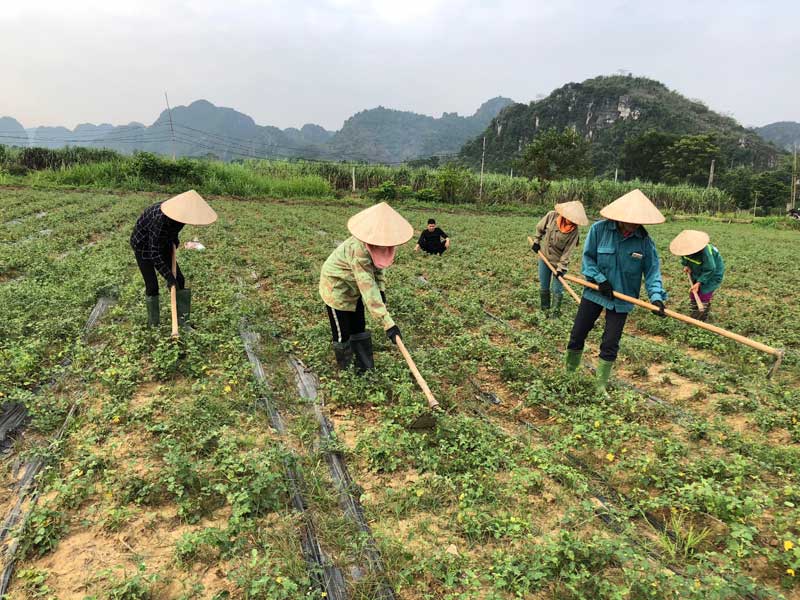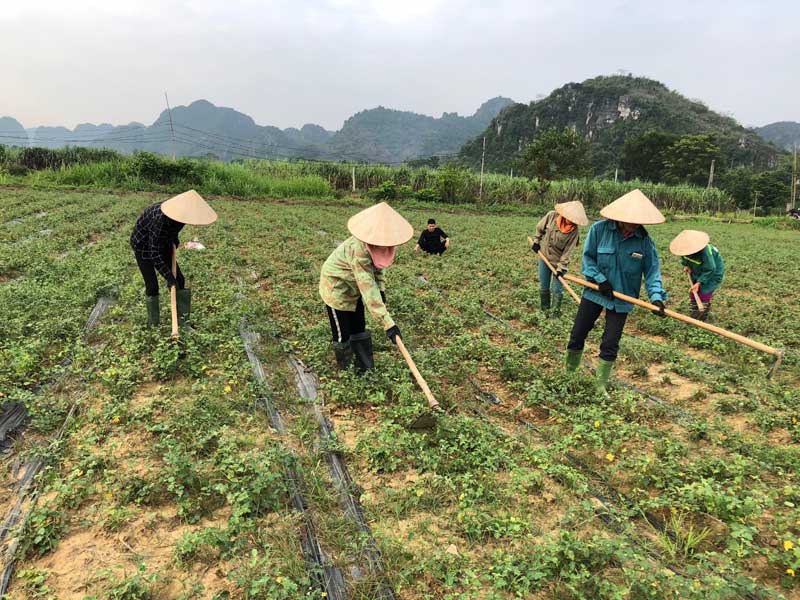
(HBO) – Yen Thuy district has enjoyed robust changes in its agriculture, particularly after implementing agricultural shake-up project coupled with building new style rural areas in ten years, local production has been developed in a sustainable manner, which helps increase added value for local goods while improving income for farmers. The success was due to the Party and State’s support and proactive participation of local people.
 Bao Hieu agricultural cooperative in
Bao Hieu commune, Yen Thuy district grows solanum trilobatum in accordance with
VietGAP standard, and develops a production and consumption model for the
plant.
Bao Hieu agricultural cooperative in
Bao Hieu commune, Yen Thuy district grows solanum trilobatum in accordance with
VietGAP standard, and develops a production and consumption model for the
plant.
A wide range of favourable policies
were carried out to support local production. Nearly 230 hectares of land
quality was improved, including 159.19 hectares in line with the province’s
project, and expanded 70.5 hectares. The acreage for plantation of citrus
fruits continued to be expanded to 600 hectares.
Together with agricultural policies integrated into the new style rural area
building programme, many value chains have been formed in the district.
Yen Thuy district is currently home to 22 agricultural cooperatives and 27
agricultural artels, who play an important role in building brand names for
local staples, developing effective production models, and controlling food
safety and hygiene.
Communes and towns across the districts have shifted to cultivate in value
chains with key agriculture products like hill chickens, pigs, wax guard and
pharmaceutical plants, among others.
By the end of June, the value chains earned the district 290.64 billion VND
(12.5 million USD), up 7.73 percent from the same time last year, of which the
husbandry sector contributed 224.8 billion VND, increasing 9.16 percent year on
year.
Local residents were happy with robust production as their incomes have been
better. Last year, income per capita in the district’s rural area reached 29.91
million VND, while the rate of poor households dropped to 13.99 percent.
The district is striving to build three more value chain models, develop three OCOP
(one commune one product) products, and establish five new agricultural
cooperatives.
According to data from the Hoa Binh Provincial Party Committee, the industrial production index for the first six months of 2025 is estimated to have increased by 20% compared to the same period last year. This marks the highest year-on-year growth rate for this period since 2020.
In the first six months of 2025, Hoa Binh province’s export turnover was estimated at 1.145 billion USD, marking an 18.11% increase compared to the same period in 2024. Import turnover was estimated at $ 804 million, a 17.15% increase, which helped the province maintain a positive trade balance.
The lives of the ethnic minority farmers in Tan Lac district have gradually improved thanks to the new directions in agricultural production. This is a testament to the collective strength fostered through the professional associations and groups implemented by various levels of the district’s Farmers’ Union.
With the motto the "product quality comes first,” after nearly one year of establishment and operation, Muong village’s Clean Food Agricultural and Commercial Cooperative, located in Cau Hamlet, Hung Son Commune (Kim Boi district), has launched reputable, high-quality agricultural products to the market that are well-received by consumers. The products such as Muong village’s pork sausage, salt-cured chicken, and salt-cured pork hocks have gradually carved out a place in the market and they are on the path to obtaining the OCOP certification.
In the past, the phrase "bumper harvest, rock-bottom prices" was a familiar refrain for Vietnamese farmers engaged in fragmented, small-scale agriculture. But today, a new spirit is emerging across rural areas of Hoa Binh province - one of collaboration, organisation, and collective economic models that provide a stable foundation for production.
Maintaining growing area codes and packing facility codes in accordance with regulations is a mandatory requirement for agricultural products to be eligible for export. Recently, the Department of Agriculture and Environment of Hoa Binh province has intensified technical supervision of designated farming areas and packing facilities to safeguard the "green passport" that enables its products to access international markets.



 Bao Hieu agricultural cooperative in
Bao Hieu commune, Yen Thuy district grows solanum trilobatum in accordance with
VietGAP standard, and develops a production and consumption model for the
plant.
Bao Hieu agricultural cooperative in
Bao Hieu commune, Yen Thuy district grows solanum trilobatum in accordance with
VietGAP standard, and develops a production and consumption model for the
plant.